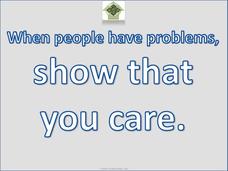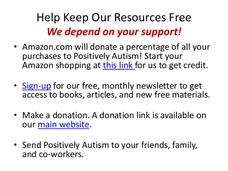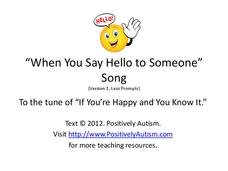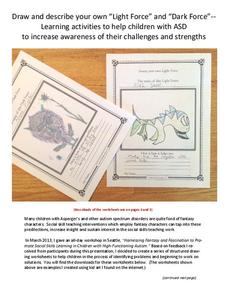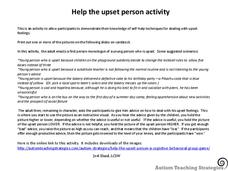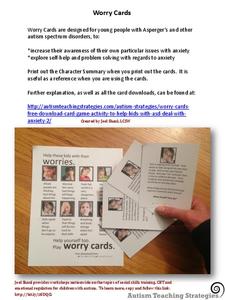Curated OER
Paper Fortune Tellers for Exploring Upsetting Emotions
What kinds of thoughts help us to cope with problems and approach difficult situations? Support learners on the autism spectrum in exploring their emotions and considering the connection between our thoughts and our feelings using one of...
Curated OER
Minting New Thoughts
Consider a new metaphor when discussing positive thinking with your learners by having them "recycle" their negative, poison thoughts and "minting" them into positive ones using these dollar bill printables!
Curated OER
Show That You Care
Learners on the autism spectrum can have difficulty expressing care or providing emotional support for others. Support them with this series of presentation slides that break down the steps to showing others you care, from appropriate...
Curated OER
Social Cards
Explore social isolation with learners and how to begin building important social skills with a dice and discussion activity. After rolling a particular number on a die, students then respond to an associated social card in which they...
Curated OER
Words Can Hurt; Words Can Help
Help learners on the autism spectrum comprehend the social consequences of their actions by connecting kind and hurtful words to physical, tangible experiences. The worksheets in this resource prompt students to consider things they say...
Positively Autism
"When Mom is on the Phone" Social Skills Story
How should youngsters act when their parents are on the phone? Using the story slides in this resource, your learners will discover the importance of not interrupting a parent's phone call and how to whisper or play with toys quietly.
Positively Autism
"Share the Road" Folder/Shoebox Games
Introduce the importance of sharing and taking turns with your learners through a hands-on learning experience involving toy cars! Here you'll find activity instructions and printables to support your "Share the Road" collaborative...
Positively Autism
"Saying "Hello" to People" Social Skills Story
Support learners who may be very shy or reserved in saying "hello" to new people with this set of story slides. The presentation begins with a few slides describing why it is good to greet others, and concludes with opportunities to...
Positively Autism
"Other People Can Be First" Social Skills Story
Remind learners that sometimes other people might like to be first to answer questions, drink from the water fountain, get to the classroom, and other common daily events. This resource includes nine story slides of visuals and simple...
Positively Autism
"Saying 'No, Thank You'" Social Skills Story
Teach learners to use polite words when they do not want something, rather than being rude or aggressive, using these simple presentation slides. The presentation walks students step by step through what it means to say "No, thank you,"...
Positively Autism
Song: Eye Contact When Greeting
When you say hello to someone, look at their eyes! Set to the tune of "When You're Happy and You Know It," this activity helps learners on the autism spectrum build a valuable social and conversational skill.
Curated OER
“Light Force” and “Dark Force”
Designed for learners with autism, this set of worksheets prompts learners to design their own fantasy characters as a way of identifying emotional problems and solutions they might face on a daily basis.
Curated OER
Help the Upset Person Activity
Assess what self-help techniques your students know for dealing with upset emotions with this conversational activity. The teacher begins by role playing as an upset individual, using visual images as prompts, and then asks students for...
Curated OER
The Conversation Box
Learners on the autism spectrum can have difficulty maintaining a two-way, reciprocal conversation. Support these students with the Conversation Box activity, in which they practice conversations with their peers using the prompts and...
Curated OER
Worry Cards
Help learners on the autism spectrum build awareness of their feelings of anxiety through a hands-on learning activity. Using a set of cards with examples of the different types of anxiety someone might face, learners discuss ideas of...
Curated OER
Missing Objects Game
Help students learn how to encourage others using kindness and supportive words with this social skills game. Designed for learners on the autism spectrum, students practice using encouragement phrase prompts while another works to...
Curated OER
Tattling and Correcting Cards and Panels
When is it okay to correct others and report their mistakes? Here you'll find a tattling and correcting game in which learners draw cards describing a variety of infraction scenarios, and then ask questions to determine whether it is...
Positively Autism
"The Napping House" Big and Little
The dog is big. The mouse is little. Using vocabulary words introduced in the previous lesson, kids read, or are read, sentences and examine images that contrast big and little.
Positively Autism
"The Napping House" Sleep Items Vocabulary
Bed, blanket, pillows, sleep. Five words associated with Audrey Wood's The Napping House, are introduced in this presentation, which features one word and one illustration printed on each blue page.
Positively Autism
"The Napping House" Vocabulary
House, sleeping, bed, granny, child, dog, cat, mouse, flea. Introduce these vocabulary words before a reading of The Napping House.
Positively Autism
"The Napping House" Ways to Say Sleeping
Sleeping, dozing, snoozing. Five different ways to say sleeping are introduced in this presentation designed to preparing kids for a reading of The Napping House.
Curated OER
Girders and Wrecking Ball Activity
As learners build the "girders" of conversation by staying consistent on a particular topic, they avoid the "wrecking ball" of an off-topic comment. To help students develop this important conversation skill, this resource provides them...
Curated OER
Chain Connection and Un-Connection Activity
Learners practice remaining on topic during a conversation using printouts of chains as visual models for their work. Chains are placed in sequence while students stay on a shared topic of conversation, and a broken chain is used as a...
Positively Autism
Fine Motor Skills for the Home or Classroom
Put coins in a piggy bank. Thread a shoelace through straws. Take a nut off and place it back on a bolt. Help kids develop their fine motor skills with this series of activities.




